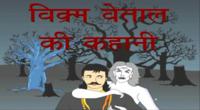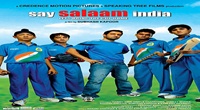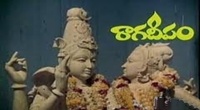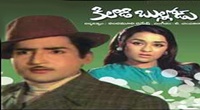A?gulim?la (P?li language; lit. 'finger necklace')) is an important figure in Buddhism, particularly within the Therav?da tradition. Depicted as a ruthless brigand who completely transforms after a conversion to Buddhism, he is seen as the example par excellence of the redemptive power of the Buddha's teaching and the Buddha's skill as a teacher. A?gulim?la is seen by Buddhists as the "patron saint" of childbirth and is associated with fertility in South and Southeast Asia.
| A?gulim?la | |
|---|---|
 Angulimala chases Gautama Buddha | |
| Religion | Buddhism |
| Education | Taxila |
| Other names | Ahi?saka, Gagga Mant?n?putta |
| Personal | |
| Nationality | Indian |
| Born | S?vatth?, Magadha or A?ga |
| Religious career | |
| Teacher | Buddha |
| Translations of A?gulim?la | |
|---|---|
| English | lit. 'finger necklace' ('he who wears fingers as a necklace') |
| Pali | A?gulim?la |
| Sanskrit | A?gulim?liya, A?gulim?lya |
| Burmese | ??????????? |
| Chinese |
???? (Pinyin: Yangjuemoluo) |
| Khmer |
??????????? (Ankulimea) |
| Sinhalese | ????????? |
| Thai |
?????????, ????????? (RTGS: Ongkhuliman) |
| Glossary of Buddhism | |
A?gulim?la's story can be found in numerous sources in P?li, Sanskrit, Tibetan and Chinese. A?gulim?la is born Ahi?saka. He grows up as an intelligent young man in S?vatth?, and during his studies becomes the favorite student of his teacher. However, out of jealousy, fellow students set him up against his teacher. In an attempt to get rid of A?g?lim?la, the teacher sends him on a deadly mission to find a thousand human fingers to complete his studies. Trying to accomplish this mission, A?gulim?la becomes a cruel brigand, killing many and causing entire villages to emigrate. Eventually, this causes the king to send an army to catch the killer. Meanwhile, A?gulim?la's mother attempts to interfere, almost causing her to be killed by her son as well. The Buddha manages to prevent this, however, and uses his power and teachings to bring A?gulim?la to the right path. A?gulim?la becomes a follower of the Buddha, and to the surprise of the king and others, becomes a monk under his guidance. Villagers are still angry with A?gulim?la, but this is improved somewhat when A?gulim?la helps a mother with childbirth through an act of truth.
Scholars have theorized that A?gulim?la may have been part of a violent cult before his conversion. Indologist Richard Gombrich has suggested that he was a follower of an early form of Tantra, but this claim has been debunked. Buddhists consider A?gulim?la a symbol of spiritual transformation, and his story a lesson that everyone can change their life for the better, even the least likely people. This inspired the official Buddhist prison chaplaincy in the UK to name their organization after him. Moreover, A?gulim?la's story is referred to in scholarly discussions of justice and rehabilitation, and is seen by theologian John Thompson as a good example of coping with moral injury and an ethics of care. A?gulim?la has been the subject of movies and literature, with a Thai movie of the same name choosing to depict him following the earliest sources, and the book The Buddha and the Terrorist by Satish Kumar adapting the story as a non-violent response to the Global War on Terror.
Contents
Textual sources and epigraphical findings
The story of A?gulim?la is most well-known in the Therav?da tradition. Two texts in the early discourses in the P?li language are concerned with A?gulim?la's initial encounter with the Buddha and his conversion, and are believed to present the oldest version of the story. The first is the Theragath?, probably the oldest of the two, and the second is the A?gulim?la Sutta in the Majjhima Nik?ya. Both offer a short description of A?gulim?la's encounter with the Buddha, and do not mention much of the background information later incorporated into the story (such as A?gulim?la being placed under oath by a teacher). Apart from the P?li texts, the life of A?gulim?la is also described in Sanskrit, Tibetan and Chinese texts. The Sanskrit collection called Sa?yukt?gama from the early M?las?rvastiv?da school, and Chinese translations of this text (translated in the 4th–5th century CE) of the early Sarv?stiv?da and K??yap?ya schools also contain early versions of the story.
Apart from these early texts, there are also later renderings, which appear in the commentary to the Majjhima Nik?ya attributed to Buddhaghosa (5th century CE) and the Theragath? commentary attributed to Dhammap?la (6th century CE). The two commentaries do not appear to be independent of one another: it appears that Dhammap?la has copied or closely paraphrased Buddhaghosa, although adding explanation of some inconsistencies. The earliest accounts of A?gulim?la's life emphasize the fearless violence of A?gulim?la and, by contrast, the peacefulness of the Buddha. Later accounts attempt to include more detail and clarify anything that might not conform with Buddhist doctrine. They also include more miracles, however, and together with the many narrative details this tends to overshadow the main points of the story. The early P?li discourses (Pali: sutta) do not provide for any motive for A?gulim?la's actions, other than sheer cruelty. Later texts may represent attempts by later commentators to "rehabilitate" the character of A?gulim?la, making him appear as a fundamentally good human being entrapped by circumstance, rather than as a vicious killer. In addition to the discourses and verses, there are also J?taka tales, the Milindapañh?, and parts of the monastic discipline that deal with A?gulim?la, as well as the later Mah?va?sa chronicle.
Later texts from other languages that relate A?gulim?la's life include the Avad?na text called Sataka, as well as a later collection of tales called Discourse on the Wise and the Fool, which exists in Tibetan and Chinese. There are also travel accounts of Chinese pilgrims that mention A?gulim?la briefly. In addition to descriptions of the life of A?gulim?la, there is a Mah?y?na discourse called the A?gulim?l?ya S?tra, which Gautama Buddha addresses to A?gulim?la. This is one of the Tath?gatagarbha S?tras, a group of discourses that deal with the Buddha Nature. Apart from textual evidence, early epigraphic evidence has also been found. One of the earliest reliefs found that depicts A?gulim?la dates from approximately 3rd century BCE.
Story
Previous incarnation
The texts describe a previous incarnation before A?gulim?la met the Buddha Gautama. In this life, he was born as a man-eating king turned yaksha (Pali: yakkha, a sort of demon; Sanskrit: yak?a), in some texts called Saud?sa. Saud?sa develops an interest in consuming human flesh when he is served the flesh of a dead baby. When he asks for more, his subjects start to fear for their children's safety and he is driven from his own kingdom. Growing into a monster, Saud?sa meets a deity that promises Saud?sa can retrieve his status as king if he sacrifices one hundred other kings. Having killed 99 kings, a king called Sutasoma changes Saud?sa's mind and makes him a religious man, and he gives up all violence. The texts identify Sutasoma with a previous incarnation of the Buddha, and Saud?sa with a previous incarnation of A?gulim?la.
Youth
In most texts, A?gulim?la is born in S?vatth?, in the brahman (priest) caste of the Gagga clan, his father Bhaggava being the chaplain of the king of Kosala, and his mother called Mant?n?. According to commentarial texts, omens seen at the time of the child's birth (the flashing of weapons and the appearance of the "constellation of thieves" in the sky) indicate that the child is destined to become a brigand. As the father is interpreting the omens for the king, the king asks whether the child will be a lone brigand or a band leader. When Bhaggava replies that he will be a lone brigand, the king decides to let it live.
Buddhaghosa relates that the father names the child Ahi?saka, meaning 'the harmless one'. This is derived from the word ahi?sa (non-violence), because no-one is hurt at his birth, despite the bad omens. The commentary by Dhammap?la states that he is initially named Hi?saka ('the harmful one') by the worried king, but that the name is later changed.
Having grown up, Ahi?saka is handsome, intelligent and well-behaved. His parents send him to Taxila to study under a well-known teacher. There he excels in his studies and becomes the teacher's favorite student, enjoying special privileges in his teacher's house. However, the other students grow jealous of Ahi?saka's speedy progress and seek to turn his master against him. To that end, they make it seem as though Ahi?saka has seduced the master's wife. Unwilling or unable to attack Ahi?saka directly, the teacher says that Ahi?saka's training as a true brahman is almost complete, but that he must provide the traditional final gift offered to a teacher and then he will grant his approval. As his payment, the teacher demands a thousand fingers, each taken from a different human being, thinking that A?gulim?la will be killed in the course of seeking this grisly prize. According to Buddhaghosa, Ahi?saka objects to this, saying he comes from a peaceful family, but eventually the teacher persuades him. But according to other versions, Ahi?saka does not protest against the teacher's command.
In another version of the story, the teacher's wife tries to seduce Ahi?saka. When the latter refuses her advances, she is spiteful and tells the teacher Ahi?saka has tried to seduce her. The story continues in the same way.
Life as a brigand
Following his teacher's bidding, A?gulim?la becomes a highwayman, living on a cliff in a forest called J?lin? where he can see people passing through, and kills or hurts those travelers. He becomes infamous for his skill in seizing his victims.
Watch movie Angulimal online on Amazon
Watch movie Angulimal online
Watch The Movie On PrimeJaan Full HD Movie Download

Aayee Milan Ki Raat Full HD Movie Download

Thanedaar Full HD Movie Download

Marte Dam Tak Full HD Movie Download

Bheegi Raat Full HD Movie Download

Love 86 Full HD Movie Download

Aasoo Bane Angaarey Full HD Movie Download

Prem Aggan Full HD Movie Download

Vikram Vetal Ki Kahani Full HD Movie Download

Tawaif Full HD Movie Download

Romeo Juliet Full HD Movie Download

Say Salaam India Full HD Movie Download

Maleyali Jotheyali Full HD Movie Download

Mere Chor Mandli Full HD Movie Download

Raajadaani Full HD Movie Download

Srimathi Priyanka Full HD Movie Download

Pasivadi Pranam Full HD Movie Download

Raaga Deepam Full HD Movie Download

Kiladi Bullodu Full HD Movie Download

Vijay Full HD Movie Download

Fanaa Full HD Movie Download

Download latest Movie from bollywood
- 1> baaghi 3
- 2> THE SKY IS PINK MOVIE FULL STORY AND REVIEW
- 3> Luka Chuppi
- 4> TO ALL THE BOYS I’VE LOVED BEFORE
- 5> Kabir Singh
- 6> Street Dancer 3D
- 7> Simmba
- 8> Gone Girl
- 9> The Girl Who Lived
- 10> Ludo
- 11> DILWALE DULHANIA LE JAYENGE
- 12> GUILTY
- 13> The Godfather
- 14> Adventures of Rusty
- 15> Sooryavanshi
- 16> Satyameva Jayate 2
- 17> Thappad
- 18> Bhool Bhulaiyaa 2
- 19> KGFChapter 2
- 20> Mardaani 2
- 21> Pinjar
- 22> Shivaji maharaj
- 23> Ek Villian 2
- 24> Hungama 2
- 25> Divergent
- 26> Mumbai Saga
- 27> The Internship
- 28> HIT (telugu)
- 29> Panga
- 30> The perfect date
- 31> 16 December
- 32> Gopala Gopala (Telugu)
- 33> Brahmastra
- 34> Gangubai Kathiawadi
- 35> Manmadhudu
- 36> Nenu local
- 37> Mahanati
- 38> Shatamanam bavathi
- 39> Lagaan
- 40> After
- 41> MOM
- 42> Shamshera
- 43> Raguvaran BTech
- 44> Khakee
- 45> The villain
- 46> OM
- 47> Mr. perfect
- 48> Bueatifull mind
- 49> Hichki
- 50> Gabbar Singh
- 51> Jogi
- 52> Before Sunrise
- 53> Before Sunset
- 54> Before Midnight
- 55> The Big Bull
- 56> Top Gun: Maverick
- 57> The Purge
- 58> The Sky is Pink
- 59> Laxmmi Bomb
- 60> Sadak 2
- 61> Sufna
- 62> Prithviraj
- 63> PK
- 64> Coolie No 1(2020)
- 65> Black Widow
- 66> Dear Zindagi
- 67> Dil Bechara
- 68> PHIR HERA PHERI
- 69> WAR
- 70> Dostana
- 71> RRR: Roudram Ranam Rudhiram
- 72> Maidan
- 73> Dabbang 3
- 74> Chhalaang
- 75> life as we know it
- 76> SherShaah
- 77> Sandeep Aur Pinky Faraar
- 78> Event Horizon
- 79> 83
- 80> Radhe: Your Most Wanted Bhai
- 81> Gunjan Saxena: The Kargil Girl
- 82> Mr India
- 83> Vivah
- 84> Anokha Bandhan
- 85> Ghost
- 86> Bhoot: Part One - The Haunted Ship
- 87> Haseen Dilruba
- 88> Laal Singh Chaddha
- 89> Qismat
- 90> Rajput
- 91> Drive
- 92> Dil Chahta Hai
- 93> Dil Ki Baazi
- 94> Dil Ka Rishta
- 95> Teesri Manzil
- 96> Dil
- 97> Love Aaj Kal
- 98> Khaali Peeli
- 99> Bunty Aur Babli 2
- 100> Atrangi Re
- 101> Gulabo Sitabo
- 102> Jodi
- 103> Suraj Pe Mangal Bhari
- 104> Deewana
- 105> Attack
- 106> Sardar Udham Singh
- 107> Toofan
- 108> THE LOVEBIRDS
- 109> Jersey
- 110> Ginny Weds Sunny
- 111> Thalaivi
- 112> Shiddat
- 113> Angels vs Zombies
- 114> Koi Mil Gya
- 115> Thank God
- 116> Bhuj: The Pride of India
- 117> Hum Aapke Hain Kaun
- 118> The Platform
- 119> Bird Box
- 120> Roohi Afzana
- 121> Torbaaz
- 122> Nikamma
- 123> World War Z
- 124> Extraction
- 125> Train to Busan
- 126> Life of Pi
- 127> SHAADI MEIN JROOR AANA
- 128> Himmat Aur Mehnat
- 129> To All The Boys: P.S. I Still Love You
- 130> Mimi
- 131> Good Newwz
- 132> Shubh Mangal Zyada Saavdhan
- 133> Raabta
- 134> Harry Potter and the Philosopher's Stone
- 135> Harry Potter and the Chamber of Secrets
- 136> Chhapaak
- 137> War of the Worlds
- 138> Harry Potter and the Prisoner of Azkaban
- 139> Harry Potter and the Goblet of Fire
- 140> MURDER MYSTERY
- 141> Shakuntala Devi
- 142> Bachchan Pandey
- 143> Jayeshbhai Jordar
- 144> Sheer Qorma
- 145> Saina
- 146> 'O' Pushpa I hate tears
- 147> Kedarnath
- 148> MS Dhoni The Untold Story
- 149> Chhichhore
- 150> Badhaai Ho
- 151> Unstoppable
- 152> Oz the Great And Powerful
- 153> The Girl on the Train
- 154> Haathi Mere Saathi 2020
- 155> The Conjuring: The Devil Made Me Do It
- 156> Gandhi Se Pehle Gandhi
- 157> The Song of Scorpions
- 158> Srimanthudu
- 159> Hello Guru Prema Kosame
- 160> Beauty and The Beast
- 161> Black Panther
- 162> Charlie and the Chocolate Factory
- 163> Bole Chudiyan
- 164> Fidaa
- 165> Duvvada Jagannadham
- 166> Bruce Lee: The Fighter
- 167> Hyper
- 168> Yaara
- 169> Red (2020)
- 170> Shivam
- 171> That Is Mahalakshmi
- 172> Nishabdham
- 173> Aashram 2020 web series
- 174> Laxmii
- 175> Mismatched
- 176> STUDENT OF THE YEAR 2
- 177> NAIL POLISH
- 178> Ramprasad Ki Tehrvi
- 179> KAAGAZ
- 180> 12 o Clock
- 181> The Power
- 182> bolo hau
- 183> Tribhanga
- 184> JAMUN
- 185> Madam Chief Minister
- 186> Maasaab
- 187> Aadhaar
- 188> Tanhaji
- 189> Bhaagi 3
- 190> Bhootnath
- 191> MALANG
- 192> Jai Mummy Di
- 193> Haathi Mere Saathi 2021
- 194> Shakeela
- 195> Unpaused
- 196> Annayya
- 197> Vamsoddharakudu
- 198> Mrugaraju
- 199> Narasimha Naidu
- 200> Sankranti
- 201> Manasu Maata Vinadhu
- 202> Anjaane
- 203> Apaharan
- 204> Bachke Rehna Re Baba
- 205> Bewafaa
- 206> Roohi
- 207> Radhe
- 208> Zindagi Khoobsoorat Hai
- 209> Yeh Mohabbat Hai
- 210> Yeh Kya Ho Raha Hai?
- 211> The Tomorrow War
- 212> DehradunDiary
- 213> Meri Shaadi Karaoo
- 214> Matruu Ki Bijlee Ka Mandola
- 215> No One Killed Jesica
- 216> Aag Ka Goola
- 217> Eight Million Dollars
- 218> Three Hundred
- 219> Cats and Dog
- 220> Decoy
- 221> Gold Rush
- 222> You Have Got Mail
- 223> Final Destination three
- 224> Tofan
- 225> Jungle
Request for Download movie Angulimal
- Bollywood movies
- Latest Bollywood movies
- Download all bengali movies
- Download all bhojpuri movies
- Download all english movies
- Download all gujarati movies
- Download all hindi movies
- Download all kannada movies
- Download all malayalam movies
- Download all marathi movies
- Download all oriya movies
- Download all punjabi movies
- Download all tamil movies
- Download all telugu movies
- Bollywood action movies
- Bollywood adventure movies
- Bollywood animation movies
- Bollywood classical movies
- Bollywood comedy movies
- Bollywood crime movies
- Bollywood devotional movies
- Bollywood documentary movies
- Bollywood drama movies
- Bollywood family movies
- Bollywood fantasy movies
- Bollywood historical movies
- Bollywood history movies
- Bollywood horror movies
- Bollywood musical movies
- Bollywood mystery movies
- Bollywood mythological movies
- Bollywood patriotic movies
- Bollywood romance movies
- Bollywood romantic movies
- Bollywood sci-fi movies
- Bollywood social movies
- Bollywood spiritual movies
- Bollywood sports movies
- Bollywood suspense movies
- Bollywood thriller movies
- Bollywood war movies
- Hot actress list
- Hot gujarati actress list
- Hot tamil actress list
- Hot bhojpuri actress list
- Hot assam actress list
- Hot bihari actress list
- Hot jammu and kashmir actress list
- Hot gujarati actress list
- Hot haryana actress list
- Hot konkani actress list
- Hot marathi actress list
- Hot odia actress list
- Hot punjabi actress list
- Hot rajasthani actress list
- Hot kannada actress list
- Hot malayalam actress list
- Hot telugu actress list
- Hot tulu actress list
- Hot Actress list from Indian city
- Hot actress list from ahmedabad
- Hot actress list from alappuzha
- Hot actress list from bangalore
- Hot actress list from bangalore
- Hot actress list from bhopal
- Hot actress list from chandigarh
- Hot actress list from chennai
- Hot actress list from guwahati
- Hot actress list from hyderabad, india
- Hot actress list from indore
- Hot actress list from jaipur
- Hot actress list from kannur
- Hot actress list from kochi
- Hot actress list from kolkata
- Hot actress list from kollam
- Hot actress list from kottayam
- Hot actress list from kozhikode
- Hot actress list from lucknow
- Hot actress list from madurai
- Hot actress list from mangalore
- Hot actress list from mumbai
- Hot actress list from mysore
- Hot actress list from new delhi
- Hot actress list from patna
- Hot actress list from pune
- Hot actress list from thiruvananthapuram
- Hot actress list from thrissur
- Hot actress list from tiruchirappalli
- Hot actress list from vijayawada
- Hot actress list from visakhapatnam
- All Bollywood Movies
- Bollywood Celeb
- >Art Director
- >Audiography
- >Background Music
- >Banner
- >Choreographer
- >Cinematographer
- >Costume Designer
- >Dialogue Writer
- >Director
- >Distributor
- >Editor
- >Executive Producer
- >Hair Stylist
- >Lyricist
- >Music Director
- >Photographer
- >Playback Singers
- >Presenter
- >Producer
- >Production Company
- >Production Designer
- >Screenplay
- >Singer
- >Sound
- >Actor
- >Story Writer
- >Studio
- >Video Director
- >Miscellaneous
- >Publicity (pro)
- >Web Creator
- >Production Labs
- >Publicity Design
- >Publicity Stills
- >Writer
- >Miscellaneous Artists
- >Visual Effects
- >Reporter
- >Music Company
- >Shooting Studios
- >Picturised On
- >Line Producer
- >Co Producer
- >Asst Director
- >Casting Director
- >Cinematography
- >Choreography
- >Dialouge
- >Editing
- >Lyrics
- >Music
- >Story
- >Playback Singer Female
- >Playback Singer Male
- >Actor In A Comic Role (male/female)
- >Child Artiste
- >Ensemble Cast
- >Actor Popular Choice (male)
- >Actor Popular Choice (female)
- >Sa Re Ga Ma Pa Song Of The Year
- >Actor In Supporting Role
- >Actress In Supporting Role
- >Actor In Leading Role
- >Art Direction
- >Actress In Leading Role
- >Sound Recording
- >Costume Design
- >Special Effects
- >Action
- >Actor In A Negative Role
- >Lifetime Achievement Award
- >Cinematic Exellence (director)
- >Cinematic Exellence (male)
- >Cinematic Exellence (female)
- >International Male Icon
- >International Female Icon
- >Actor In A Supporting Role (male)
- >Actor In A Supporting Role (female)
- >Actor In A Comic Role
- >Playback Singer (male)
- >Playback Singer (female)
- >Most Promising Debut (female)
- >Most Promising Debut (male)
- >Most Promising Director
- >Sound Design
- >Lifetime Jodi
- >Marketed Film
- >Jury Award For Best Actor
- >Jury Award For Best Actress
- >Jury Award For Best Film
- >Jury Award For Best Director
- >Playback Singer(male)
- >Lifetime Acheivement Award (male)
- >Excellence Award
- >Jodi Award
- >Performer Of The Year
- >Presented By
